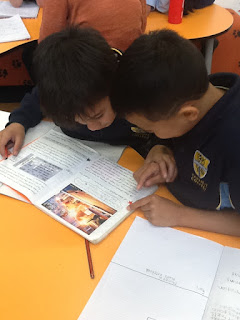The Voices of Student Poets

Poetry at Brighton Primary School, Adelaide, South Australia Last Friday I had the special treat of working with Year 7 poets from Brighton Primary School in Adelaide. During the day we closely examined a range of poetic structures and devices and applied them to our writing of poetry. With one group I introduced Suzanna Marshak’s powerful book ‘I Am The Ocean’ to alert these enthusiastic poets to the potential power of writing through a mask and using personification. Another group looked at personification through their connection to things in the world around them. Pre-writing discussion followed by intensive writing. Using the poem, ‘I Am These Things And More’ as a model. Students were challenged to think about these important connections. A particular focus of the writing was to try to incorporate effective use of repetition, line breaks, simile and white space in their composed pieces. These young poets talked in groups and identified t...



